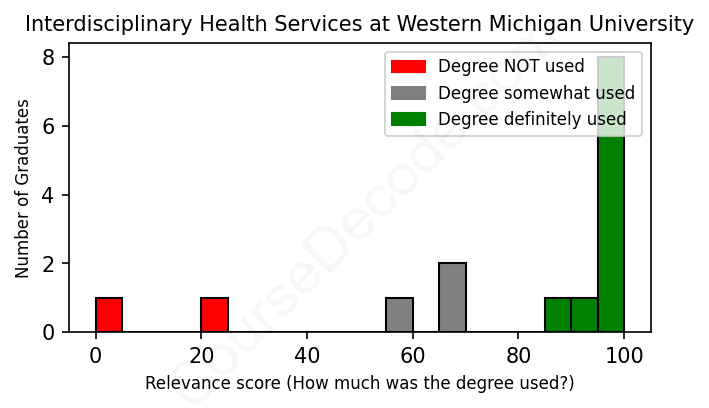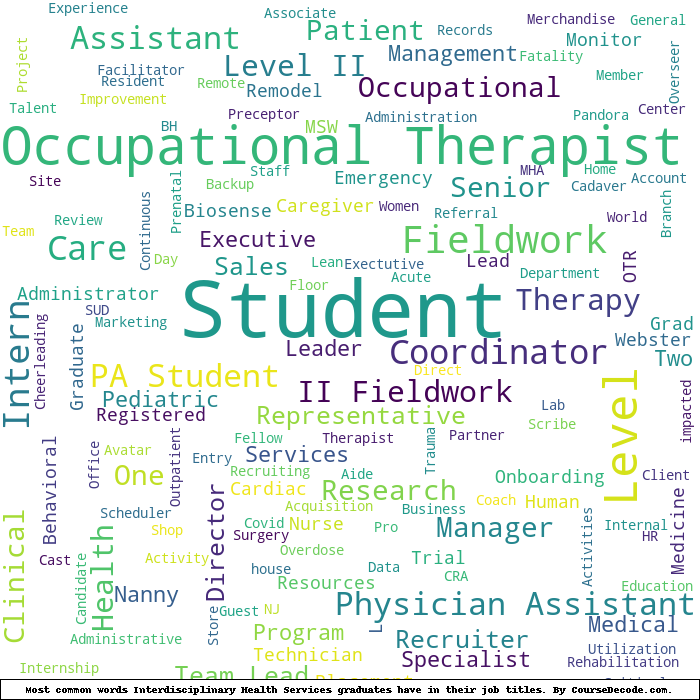
First, some facts. Of the Interdisciplinary Health Services graduates from Western Michigan University we've analyzed , here's how many have used (or NOT used) their degree in their career:

These are estimates based on AI analysis of 15 LinkedIn profiles (see below).
The verdict? Significantly above average. Overall, with an average relevance score of 79%, Interdisciplinary Health Services graduates from Western Michigan University have a much higher likelihood (+12%) of finding work in this field compared to the average graduate across all fields:
And for comparison, here's the chart for all profiles we've looked at across all degrees.
Also, after graduating, 53% of these graduates have pursued further education other than another Bachelor's degree (such as a Masters degree or other), compared to the average across all profiles of 35%. This suggests you may need more than just a Bachelors degree to be competitive as a Interdisciplinary Health Services graduate.
See the details:
|
Relevance score: 98% We think this person has gone into a career highly relevant to their degree. We think this person has gone into a career highly relevant to their degree.
DEGREE INFOGraduated in 2017 from Western Michigan University with a Bachelor of Science - BS in Interdisciplinary Health Services. Also pursued further education since (see below). JOB HISTORY SINCE GRADUATIONIntern Student Wmu Center For Disability Svcs Jan 2017 - Apr 2017 Caregiver  Home Instead Senior Care Jul 2017 - Aug 2018 Caregiver  Care.com Jan 2018 - Aug 2018 Nanny  Care.com Apr 2018 - Aug 2018 Nanny  Care.com Oct 2018 - Jun 2020 Occupational Therapist  Chitter Chatter P.C. Apr 2021 - Aug 2022 Occupational Therapist  OT for Kids Inc Aug 2022 - Aug 2023 Occupational Therapist  TherapyWorks Jul 2022 - Present Occupational Therapist  Ivy Rehab for Kids Aug 2023 - Present FURTHER DEGREES DONE SINCE GRADUATINGMaster's degreeUniversity of Minnesota 2018 - 2020 ABOUTNo information provided. |
The top 10 most common jobs done by the graduates we've analyzed (ranked most common to least) are:
When checking out the career paths of graduates from Western Michigan University with a degree in Interdisciplinary Health Services, it's clear that many of them have gravitated towards roles that are quite relevant to their studies. A significant number of them have found positions as Occupational Therapists and other healthcare practitioners—like Registered Nurses and Clinical Research Coordinators—that directly apply the skills and knowledge they acquired during their degree program. These roles often involve patient care, research, and management within health services, which shows a solid connection to their studies. Depending on their specific focus and interests, many of these graduates have high levels of engagement with the core principles of health service delivery.
However, there are also quite a few graduates who ended up in jobs that don’t directly leverage their degree. For example, positions in human resources, sales recruitment, and even some internships lacked a clear link to health services knowledge and skills, making them less relevant. It really highlights that while there's a strong trend toward relevant jobs, not every graduate finds a direct application of their Interdisciplinary Health Services training. Overall, it seems like many graduates do land in fields where they can make use of their education, but there’s a mix of experiences depending on individual career choices.
Here is a visual representation of the most common words in job titles for Interdisciplinary Health Services graduates (this is across all Interdisciplinary Health Services graduates we've analyzed, not just those who went to Western Michigan University):

When looking at the career trajectories of graduates from the Interdisciplinary Health Services program at Western Michigan University, it's clear that many have carved out solid paths in the healthcare sector. For many, the first job post-graduation tends to be entry-level positions such as patient care assistants, schedulers, or research coordinators, which help them gain foundational experience in health services. Over the years, we see a trend where many graduates progress into more specialized and managerial roles, especially in fields like occupational therapy and healthcare administration. For instance, those who started in roles as caregivers or health aides often transition into more professional roles like registered nurses or therapists within a few years. It’s encouraging to see that many have remained within the health services field, indicating that the degree was indeed relevant for their career goals.
Fast forward five to ten years, many graduates are taking on significant roles, like occupational therapists, administrators, and specialized coordinators in health services. Some have moved into leadership positions, showcasing growth in their careers. However, there are variations; while many have achieved relevance in their careers, a few have dispersed into unrelated fields or taken jobs that may not fully utilize their degree. Nevertheless, the overall picture suggests that the program equips graduates with valuable skills and knowledge that are applicable and sought after in the healthcare industry, marking a positive outcome for graduates from Western Michigan University.
Getting a Bachelor's degree in Interdisciplinary Health Services at Western Michigan University, like any college degree, can be a mixed bag in terms of difficulty. Generally speaking, it’s not considered super hard compared to some more technical or specialized majors, but it does require a good amount of reading, understanding of health concepts, and some group projects or presentations. You’ll be crossing over between health sciences, social sciences, and maybe even some bits of policy, which keeps things interesting but can also mean you're juggling different perspectives and assignments. So, if you're curious and willing to put in the effort, it can be pretty manageable, but you definitely have to stay organized and engaged to keep up with everything!
Most commonly, in the LinkedIn profiles we've looked at, it takes people 4 years to finish a Bachelor degree in Interdisciplinary Health Services.
Based on the job paths of these Interdisciplinary Health Services graduates from Western Michigan University, it seems like they’ve been doing pretty well for themselves, especially in the health-related fields. Some of them, like those who progressed to roles as Occupational Therapists or Program Managers in rehabilitation services, likely make solid salaries that reflect their skills and responsibilities. Even graduates who started in entry-level positions have moved into higher-paying roles over time, particularly in recruitment and management at companies like Stryker. Of course, not everyone is raking in the big bucks, especially those who’ve focused on positions like caregivers or entry-level health aides, but overall, there’s a good mix of salaries across various roles that suggest a decent earning potential for these grads.
Here is a visual representation of the most common words seen in the "about" section of LinkedIn profiles who have a Bachelor degree in Interdisciplinary Health Services (this is across all Interdisciplinary Health Services graduates we've analyzed, not just those who went to Western Michigan University). This may or may not be useful:

Here are all colleges offering a Bachelor degree in Interdisciplinary Health Services (ordered by the average relevance score of their Interdisciplinary Health Services graduates, best to worst) where we have analyzed at least 10 of their graduates:
| College | Score | Count |
|---|---|---|
 Western Michigan University Western Michigan University
|
79 | 15 |